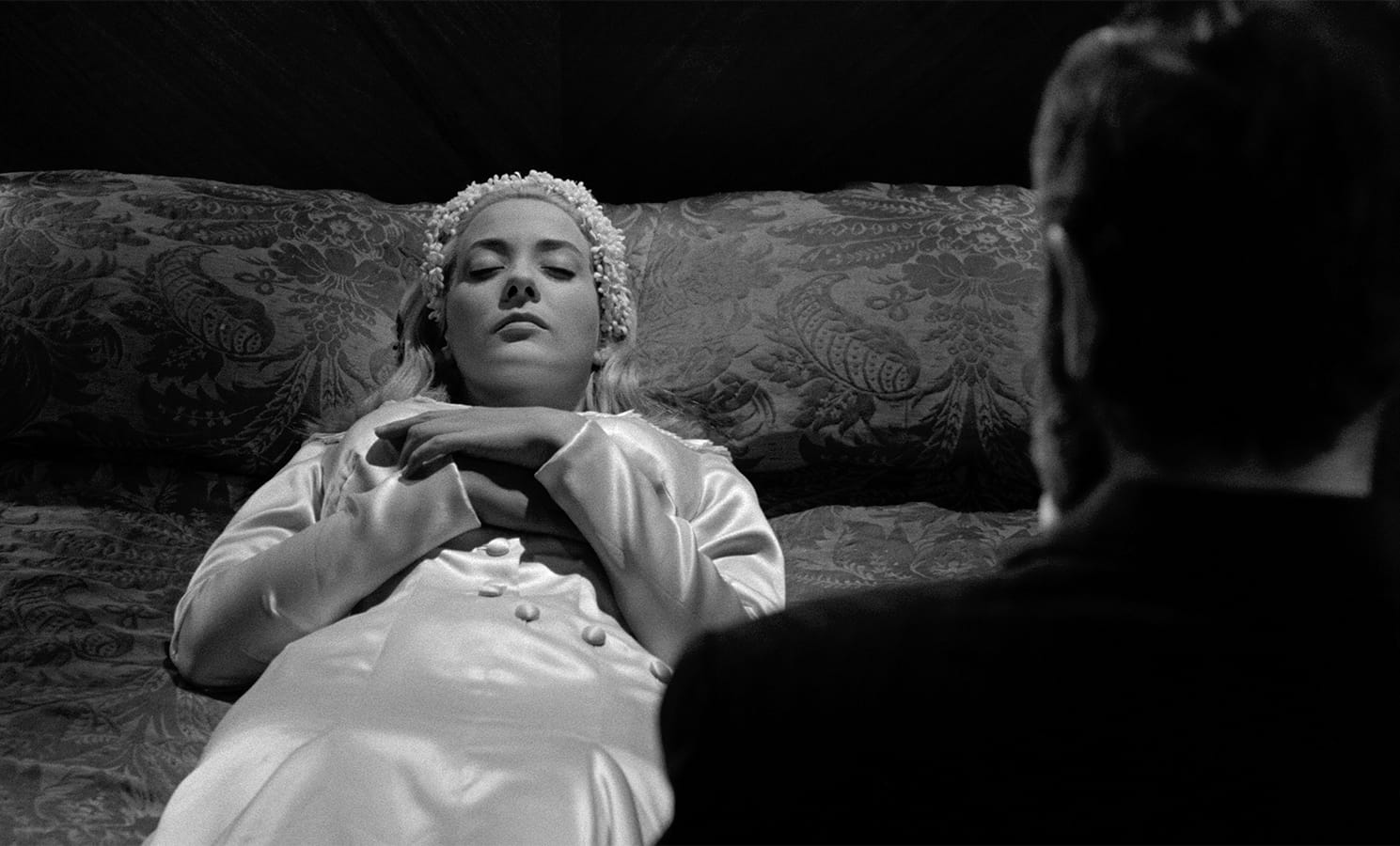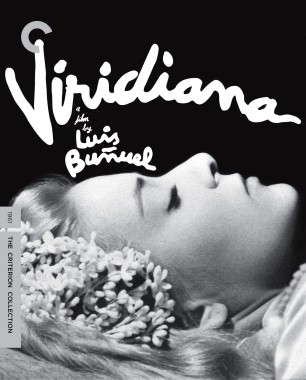Viridiana: The Human Comedy

Luis Buñuel shot Viridiana in the early months of 1961, in his native Spain. It was the first film he had made there since his departure for the United States, and later Mexico, in 1938, and he was much criticized for embarking on this return at a time when the fascist dictator Francisco Franco still ruled. How could Buñuel, the protester, the loyalist, and the long-term exile, work in the enemy’s country, even if that country was also his own? But he clearly had his reasons.
A contemporary cartoon that circulated widely showed him, in its first frame, arriving in Spain to be greeted by a beaming Franco. In the background, a man is protesting loudly. In the second frame, Buñuel hands over to Franco a box wrapped with a broad, fancy ribbon. The man in the background continues to protest. In the third and last frame, the box has exploded in Franco’s face, and Buñuel is leaving. The protester is speechless. This is pretty much what happened, although the director did say in his autobiography that Franco himself reportedly didn’t especially object to the film. Buñuel added wryly, “To tell the truth, after all he had seen, the film must have seemed very innocent to him.”
Viridiana marked an important moment in Buñuel’s career, his return not only to Spain but to international fame and filmmaking. The bare facts of his life tell an interesting tale: of how a Spanish director with an interest in French surrealism became a Mexican director who shot six of his last eight films in France. Buñuel was born near Zaragoza in 1900, studied in Madrid, achieved early renown with the Salvador Dalí collaborations Un chien andalou (1929) and L’âge d’or (1930), and left his country for the United States during the Spanish Civil War. In 1946, he moved to Mexico, and in 1949 he became a Mexican citizen. He made some great films in Mexico—notably, Los olvidados (1950), Él (1953), and The Exterminating Angel (1962)—but prior to the splash made by Viridiana, they were not well-known to the world at large.
Viridiana, whatever Franco’s personal opinion, did cause a tremendous stir. It won the Palme d’Or at the Cannes Film Festival (with Henri Colpi’s Une aussi longue absence), and the Catholic world, starting with the Vatican’s newspaper, L’osservatore Romano, was instantly up in arms. The Spanish government, having initially approved the film’s submission at Cannes—although virtually no one in Spain had seen it—now sacked the official responsible for this move and banned the film; it wasn’t shown in Spain until 1977. Meanwhile, it had acquired Mexican nationality, like its director, and a vast reputation. Asked if his intention was to blaspheme, Buñuel said, with characteristic offhand wit, “I didn’t deliberately set out to be blasphemous, but then Pope John XXIII is a better judge of such things than I am.”
Buñuel didn’t set out to be blasphemous in Viridiana, and when people asked him about certain unforgettable objects or moments in the film, like the scene with the dogs tied to a moving cart by a rope that will strangle them if they stop trotting, or the small crucifix that opens to become a knife, he would simply say they were part of Spain, that he hadn’t made them up. True enough, of course, but he chose them for his film and made them into signs rather than random instances of everyday life. Even his fictional character in these scenes, presumably as Spanish as anyone, is surprised. He buys a dog to redeem it from its trotting torment, but he fails to see, as he turns away, another cart and another dog coming along in the opposite direction. This is the man who is about to criticize Viridiana for her attempts at charity. And when the same man discovers that the crucifix is also a knife, he says, “What an idea! Where could my father have found this?”
No blasphemy, then, but a merciless look at a world that cannot be saved. The film is divided very clearly into two parts: the story of an elderly man’s hopeless love and suicide, and his near violation of a young woman; and that of the young woman’s attempt to rescue a small portion of the world’s unfortunates. There is desperation in the first part and grimly comic failure in the second, but the overall effect is more spirited than that sounds—because of the endless, irreverent life in the filmmaking itself, and because of Buñuel’s commitment to the possibility of change, even when it seems impossible.
The first act of the film shows Viridiana, a young woman who is about to become a nun, returning to her uncle’s country estate for a last visit. He, Don Jaime, is enormously taken with his niece, who much resembles his dead wife. He makes a fetish of his wife’s wedding clothes—white satin shoes, veil, long dress, corset—and finally persuades Viridiana, as a special favor, to dress up as her dead aunt. He drugs her, plans to rape her, but he can’t bring himself to do it. And then, in a tormented attempt at blackmail, he tells her he did rape her, only to confess the truth soon afterward. “Te ofendí solo con el pensamiento,” he says—literally, “I offended you only in thought.” She refuses his plea for forgiveness. The words offense and forgiveness echo throughout this part of the film and are clearly its central preoccupation. Two well-intentioned people, ill-equipped for life—the man because he is timid and solitary and frustrated, the woman because she is inexperienced and self-punishingly religious—both offend in their different ways and cannot find, or no longer seek, forgiveness. Don Jaime, a curious, satisfied smile on his face in the last full shot we see of him, writes a few last instructions and hangs himself. Viridiana, in a revealing self-contradiction, says both that she feels responsible for his death and that there is nothing she need reproach herself for. She means, on the one hand, that her uncle would not have died if she had behaved differently, and, on the other, that her virtue is intact. One can feel guilty, Buñuel is saying, and even be guilty, without incurring guilt in any technical or formal sense.
The second part of the film concerns Viridiana’s attempt to do something about her guilt, and critically explores Buñuel’s commitment to change. She gathers a group of local beggars and brings them to live on the estate. Her idea is to give them shelter, clothing, and health, and to get them to work a little. And most importantly, perhaps, to provide for them, as she says, “a little human warmth” (un poco de calor humano)—precisely what was lacking in her responses to the tortured Don Jaime. Her project is mocked both by her Mother Superior and by Don Jaime’s illegitimate, and until now neglected, son, Jorge, who has inherited the property along with Viridiana, but there is no reason to suppose that Buñuel thinks her idea is inherently foolish or wrongheaded—or at least any more wrongheaded than wanting to rescue a dog from suffering if you get the chance. People make mistakes all the time in Buñuel’s films, but they are mistakes he understands and even respects.
The beggars are a fabulous crew: an imposing blind man, a scurrying clown, a woman with two small children, a pregnant woman, a lame man, a distinguished-looking old fellow from another kind of movie, a stern-looking lady from the same place, a singer, a dwarf, and a leper. Rumors surrounding the film made much of the claim that these beggars were not actors but the real thing, recruited on the outskirts of Madrid. Buñuel at times insisted that they were all actors, but there could be some truth to both stories, and at least one of the beggars, actor or not, certainly lived on the fringes of Spanish society. But the effect here is not primarily that of realism. The beggars represent a set of human possibilities that Buñuel wishes neither to deny nor to celebrate, but to confront, and this is why the film, in spite of the horror of many of its moments and the destructive anarchy of its later scenes, is exhilarating rather than merely bleak or depressing. What we are looking at is both terrible and comic, and we are the better for not having turned our gaze away. As the English critic David Robinson has written, “Other men might be affected to pity by this picture of rot and corruption. But for Buñuel, pity implies resignation, and resignation defeat.”
Left with the estate to themselves for a day, the beggars explore the main house, look at the portraits and the linen and the silver, and decide to have a feast. In a wonderfully wicked cut, Buñuel moves straight from an early moment of this exploration—two women are admiring a fine French tablecloth—to a late stage of the banquet: the main course over, bottles everywhere, and most of the company drunk. One of the small children cries, two women have an appalling fight, the leper puts on the phonograph a recording of Handel’s “Hallelujah Chorus,” to which he himself dances, wearing the corset and veil of Don Jaime’s dead bride. Others join in the dance, everyone gets drunker, one of the men assaults one of the women behind the sofa. Jealous, because the woman in question is the one he regards as his, the imposing blind man smashes everything on the table with his stick. The screenplay, perhaps evoking the feeling rather than the fact, speaks of “carnage” and of an “absurd orgy.” In the film’s most famous moment, everyone lines up along one side of the table for a “photograph” of a scene that closely mimes that of Leonardo da Vinci’s The Last Supper. It is just possible that Buñuel knew more about blasphemy than the pope did after all.
But the blasphemy is not against Christ and the Father. It is against the belief in progress—or at least the conventional sense of it—whether in the form of Jorge’s plans for improving the estate or of Viridiana’s project for improving the beggars’ lives. The beggars are not evil or the dark side of virtue. They are the unruliness of life itself, a reminder that pleasure and curiosity and appetite can always turn to destruction and violence. This is not an argument against pleasure and curiosity and appetite, or an appeal for law and order. It is a picture of a society that doesn’t understand its own needs. Buñuel’s skepticism and his sense of outrage concern the smallness of our vision of progress, our narrow attempts to achieve it through rational or moralistic planning, and our anxious disregard of the disruptive forces without which no society would be human.
This piece originally appeared in the Criterion Collection’s 2006 edition of Viridiana.




